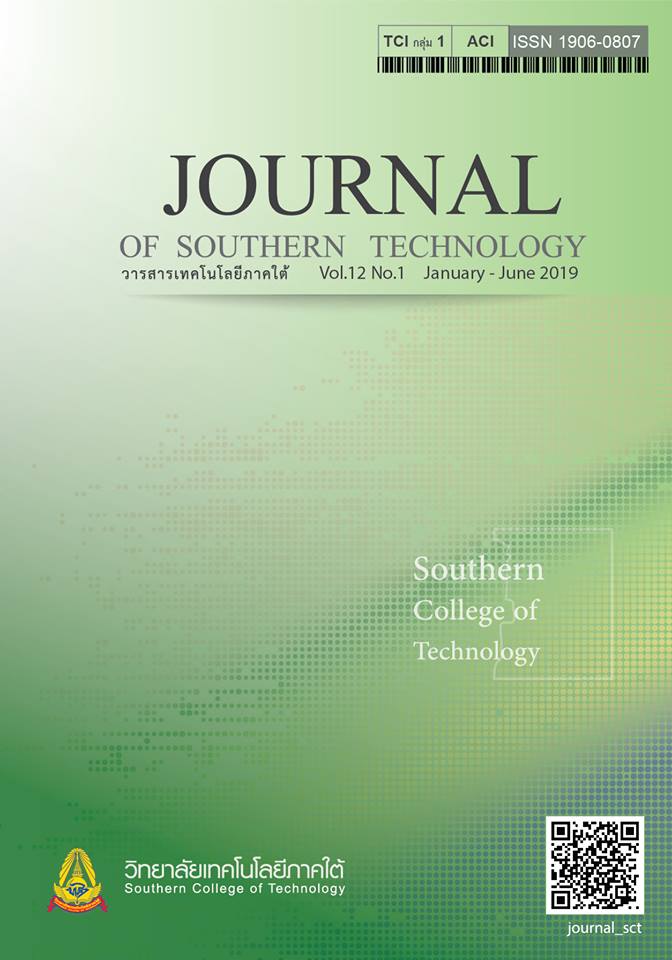The Guideline for Ecotourism Development in Lay Kao Kob Cave, Trang
Main Article Content
Abstract
This research aimed to study the potential of tourism resources, the road around and the guideline for ecotourism development in Lay Kao Kob Cave, Trang. The sample group from Taro Yamane were 286 people who have lived in moo 1, Kao Kob Village. They were selected by using the accidental sampling and the questionnaires as a research instrument. The questionnaires were assessed by examinations for quality then, they were tested by 20 sampling. To analyze statistical data, the measures namely; frequency, percentage, mean and standard deviation were used in this research.
From the research found that the total potential of tourism resources was at a high level (=4.08, S.D. = 0.89). When considering each aspect, this potential of plants were at a high level (
= 4.18, S.D. = 0.83), wild animals were at a high level (
= 3.98, S.D. = 0.95) and ecotourism was at a high level (
= 4.08, S.D. = 0.89). Moreover, the majority of the villagers (91.6 %) agree that there was an ecotourism development in Lay Kao Kob Cave. In addition, public participation in development were the 53.5 %, followed by the governor by 31.8 %, and the district chief by 4.7 % respectively. Furthermore, the guideline for ecotourism development were that the villagers agreed with natural trail by guide (97.6 %), themselves (94.8 %) and cycling (89.2 %); however, they disagreed by horse riding (78.0 %).
Article Details
-
Authors must agree to the journal publication rules and allow the editors to edit the manuscripts for publication.
-
Author’s right belongs to the author but Journal of Southern Technology holds the right of first publication and thus allow readers to use the article for the purpose of education but not commercial.
References
Developing of Nature Trail. The 4th International and 3rd National Conference “Environmental friendly
Tourism for Sustainable Development”, 19th and 20th January 2017 Thumarin Thana Hotel
Songkla: Prince of Songkla University. [in Thai]
Chirotphan, W., Sakunaphat, P., & Choeikwong, K. (2005). Ecotourism. Bangkok: Saengdao. [in Thai]
Chittangwattana, B., & Srikhampha, P. (2014). Development for Sustainable Tourism. Nonthaburi: Dharmasarn.
[in Thai]
Division of Tourism and Sports Economics in Office of the Permanent Secretary. (2017, February 16). In 2016, Tourism
can help value – added to Thai economy more than 17%. “In January 2017, it can help add value more than
10%”. Ministry of Tourism and Sports News. 4 pp. [in Thai]
Kao Kob Sub-district Administrative Organization. (2017). General Environment and Basic Information Report. Trang:
Kao Kob Sub-district Administrative Organization. [in Thai]
___________________________________________.(2018). Thumle Kao Kob. Retrieved February 20, 2018, from
https://www.thumle.com/index.php/th/. [in Thai]
Loupha, R. (2009). Development of Formal Teaching Trail at Phufoilom Ecotourism Project Area, Tambon Tabkung,
Amphoe Nongsang, Changwat Udon Thani. M.S. Thesis, Udon Thani Rajabhat University. [in Thai]
Ministry of Tourism and Sports. (2018). The Camping, the Number of Visitor and the Income from
Visitors in November, 2017. Bangkok: Ministry of Tourism and Sports. [in Thai]
Ninlaor, N., Navykarn, K., & Jewton, B. (2017). The Utilizing of Biodiversity of Lay Kao Kob Cave, Trang toward the
Participative in Eco tourism, Trang: Rajamangala University of Technology Srivijaya. [in Thai]
Office of the Royal Society. (2009). Tourism Resources. Retrieved February 20, 2018, from https://
www.royin.go.th. [in Thai]
Otawong, A. (2014). Community Participation in Talay Bua Dang conservation within Chiang Wae municipal area,
Kumphawapi District, Udon Thani Province. Academic Services Journal Prince of Songkla University, 25(1),
47–53. [in Thai]
Sakunaphat, P., Chirotphan, W., & Choeikwong, K. (2011). Ecotourism. Bangkok: Saengdao. [in Thai]
Sariwongjun, R. (2017). Long-Tailed Macaque. Bangkok: National Park, Wildlife and Plant Conservation Department.
[in Thai]
Sukhothai Thammathirat Open University. (2016). Statistics, Research and Evaluation in Education. 8th ed. Nonthaburi:
The Office of the Sukhothaithammathirat Open University Press. [in Thai]

